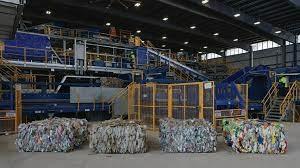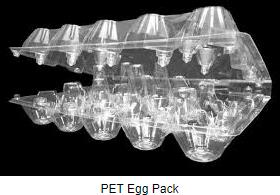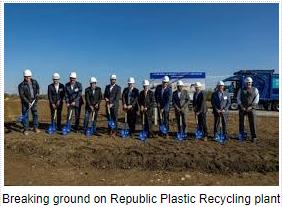 As Republic Services announces the opening of a polymer recycling center, there is concern whether this project and similar initiatives in the U.S. and the E.U. will be financially viable. The process of recycling requires closely interlinked components. Consumers have to aggregate their plastic waste, a system of collection, assembly and transport to a facility is required and a technologically efficient process should turn waste into re-useable plastic flakes. Above all, the price of recycled material, incorporating collection costs and margin with processing and detoxification should be cheaper than virgin flakes.
As Republic Services announces the opening of a polymer recycling center, there is concern whether this project and similar initiatives in the U.S. and the E.U. will be financially viable. The process of recycling requires closely interlinked components. Consumers have to aggregate their plastic waste, a system of collection, assembly and transport to a facility is required and a technologically efficient process should turn waste into re-useable plastic flakes. Above all, the price of recycled material, incorporating collection costs and margin with processing and detoxification should be cheaper than virgin flakes.
 The U.S. generates approximately 50 million tons of plastic waste annually of which less than ten percent is recycled. Polyethylene terephthalate (PET) is widely used in bottles for soda, egg cartons and the ubiquitous clamshells for fruit and small food items. This volume represents a potential source of recyclable material, limited only by the need for each of the stages in the cycle to be linked. Recycling is now mandated in a number of communities and even states. Taxes on containers and incentives to reuse content are in response to demands by environmentally concerned activists and consumers.
The U.S. generates approximately 50 million tons of plastic waste annually of which less than ten percent is recycled. Polyethylene terephthalate (PET) is widely used in bottles for soda, egg cartons and the ubiquitous clamshells for fruit and small food items. This volume represents a potential source of recyclable material, limited only by the need for each of the stages in the cycle to be linked. Recycling is now mandated in a number of communities and even states. Taxes on containers and incentives to reuse content are in response to demands by environmentally concerned activists and consumers.
Manufacturers of beverages and food are actively sourcing recycled material in order to substantiate claims for sustainability. One large multinational beverage manufacturer is responding to lawsuits from a state attorney general regarding ‘greenwashing’ over claims that targets to achieve predetermined levels of recycling are consistently extended into the future with minimal current and near-term progress.
 The fact that Republic Services has seen fit to invest $70 million into a plant to process plastic waste is an encouraging sign. Republic Services is a large company concerned with hauling trash and with connections to municipalities. This represents an advantage with respect to collection and assembly of waste products and subsequent differentiation into categories of plastic that require specific methods of processing.
The fact that Republic Services has seen fit to invest $70 million into a plant to process plastic waste is an encouraging sign. Republic Services is a large company concerned with hauling trash and with connections to municipalities. This represents an advantage with respect to collection and assembly of waste products and subsequent differentiation into categories of plastic that require specific methods of processing.
At the end of the day, any form of recycling must be financially viable. Recyclers must compete with cheap virgin flakes from Asia and from Mexico in the case of the U.S. Financial considerations also determine the acceptability and use of recycled plastic. Material from bottles and food containers are diverted to carpets and textiles. Although this removes plastic from landfills and waterways, it is not true recycling in the context of re-incorporation into similar containers in a continuous cycle.
 Stung by criticism and legal action, Coca-Cola has partnered with Republic Services in a new venture with a goal to achieve 50 percent recycled content for bottles by 2030. If the Republic Services venture is successful, it may attract competitors, establish economies of scale and promote the development of new technology for collection and sorting. Manufacturers have an obligation to harmonize their packaging requirements since different colors in waste and diverse specifications for plastic impose complications and hence, expense for recyclers.
Stung by criticism and legal action, Coca-Cola has partnered with Republic Services in a new venture with a goal to achieve 50 percent recycled content for bottles by 2030. If the Republic Services venture is successful, it may attract competitors, establish economies of scale and promote the development of new technology for collection and sorting. Manufacturers have an obligation to harmonize their packaging requirements since different colors in waste and diverse specifications for plastic impose complications and hence, expense for recyclers.
Recycling will require the commitment of consumers to positively recycle containers. Municipalities will have to accept and sort recycled material or make use of contractors at the local level. Supermarkets and groceries have a role to play in serving as collection points especially if local or state agencies introduce incentive programs for recycling.
Environmentalists claim that recycling is nonviable and are pushing for outright banning of single-use plastics. This is unacceptable, as plastic packaging adds to convenience and food safety and ultimately reduces the cost of many items. By closing the ring on recycling, consumer items and food can be packed without conscience or damage to the environment.